Learn How to Stay Ahead of Scammers
examples below illustrate how creative fraudsters are
Scams come in many forms, from emails from identity thieves pretending to be your financial institutions, to phone calls from fake IRS agents trying to get you to send money you don't owe. In threatening phone calls from fake IRS agents trying to get you to send money you don't owe. Florida Credit Union will regularly post security alerts and reports of recent scams on this page.
Security Alert 3/14/2025
Before deleting any fraudulent texts received:
- If you use an iPhone please click the blue “Report junk” button to report the message as spam. Please see sample image:
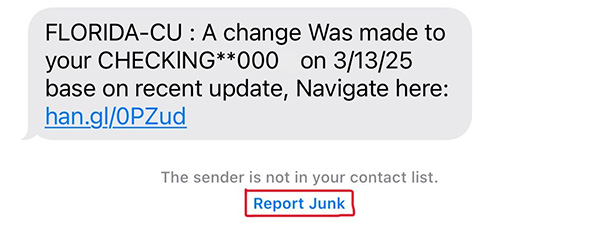
- If you use an Android please click the “Report spam” button, and then confirm in the popup box to report the message as spam.
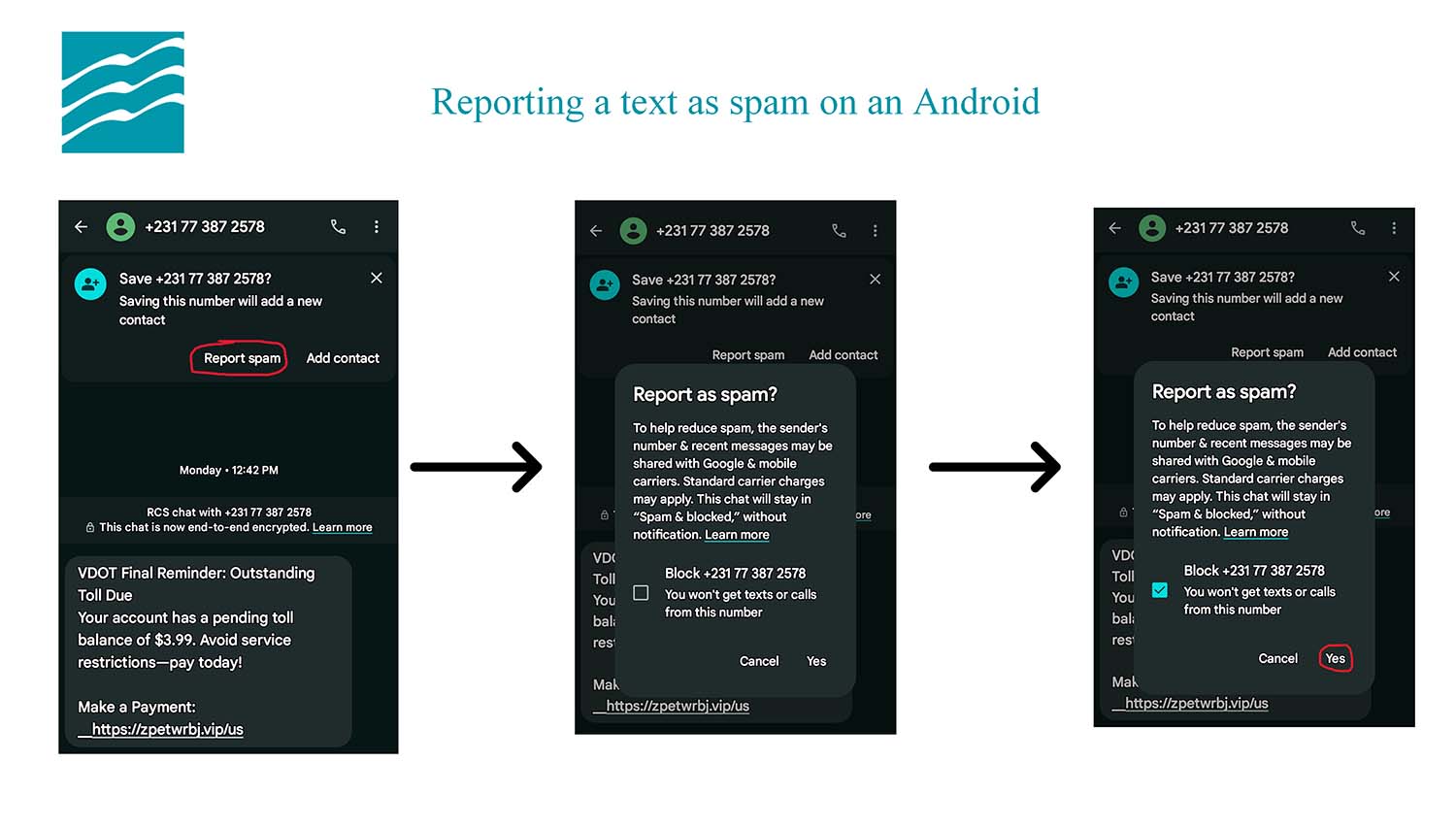
Legitimate fraud alerts will be sent from 833-978-3929 and 23618. Legitimate texts about your account status will be sent from 352-374-1918.
Security Alert 3/8/2025
 We are currently working to address the fraudulent web page. If you receive a similar text, please reach out to security@flcu.org for further identification and action.
We are currently working to address the fraudulent web page. If you receive a similar text, please reach out to security@flcu.org for further identification and action.
Security Alert 9/23/2024
Watch out for fraudulent texts pretending to be Florida Credit Union. This scammer texts a link requesting the member confirm or cancel a charge. If the member proceeds with an action, the scammer will ask for the member’s personal information in order to validate the action.
If you receive suspicious messages, send a screenshot to security@flcu.org so we can help shut down phishing sites. Also forward the text to 7726 (SPAM) so carriers can also remove the numbers. Please do not interact with these links!

We are working to address this issue. If you're ever suspicious about an interaction, please hang up immediately and call us at 800-284-1144.
Security Alert 12/19/2023
Watch out for fraudulent texts pretending to be Florida Credit Union. This scammer texts from one number, and calls from a different number if the member responds.
Sample fraudulent text:
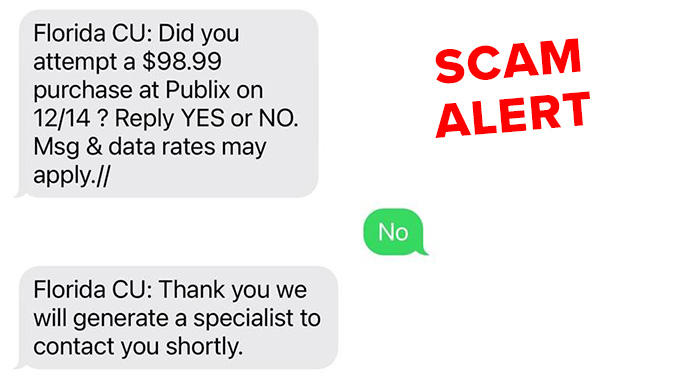
We are working to address this issue. If you're ever suspicious about an interaction, please hang up immediately and call us at 800-284-1144.
Security Alert 12/08/2023
Beware of a fraudulent text directing members and non-members to click on a non-Florida Credit Union website (url: hxxps[://]ficudata[.]com).
Sample fraudulent text:

We are currently working to take down the fraudulent website.
Security Alert 11/20/2023
Beware of a fraudulent email with an attachment indicating a notification of a returned check. The email attachment purporting to be a returned check is a web page that will run locally on the user's machine.
Please check the sender's email address to verify that Florida Credit Union is the legitimate sender of the email. Emails sent from FCU end in "@flcu.org".
Sample fraudulent email:
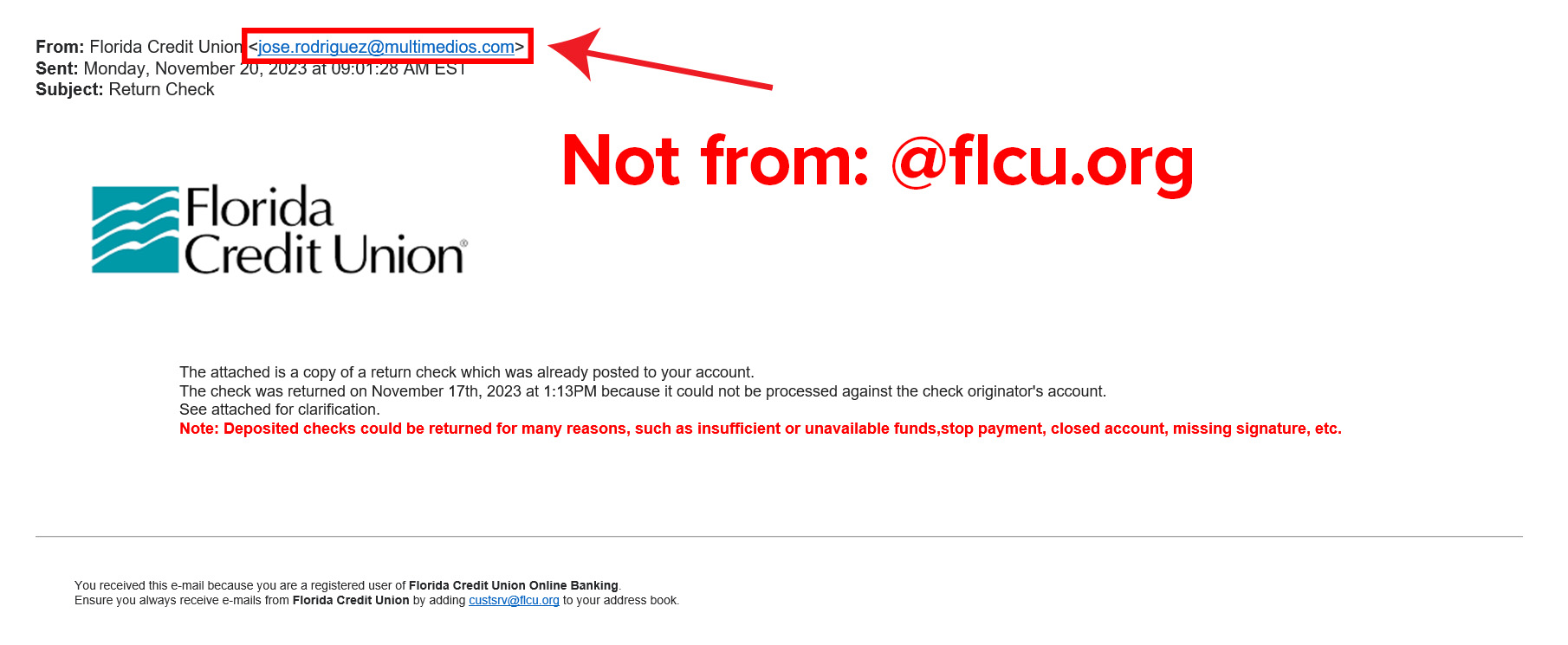
Sample fraudulent email attachment:

We are currently working to address the fraudulent web page. If you receive a similar email, please forward (with the attachment if possible) to security@flcu.org for further identification and action.
Security Alert 9/22/2023
Fraudulent texts have been reported encouraging members to enter their login credentials, personally identifiable information such as address, date of birth and social security numbers, and card information. Please do not login using these links! We are working to address these scam sites.
Sample fraudulent text:
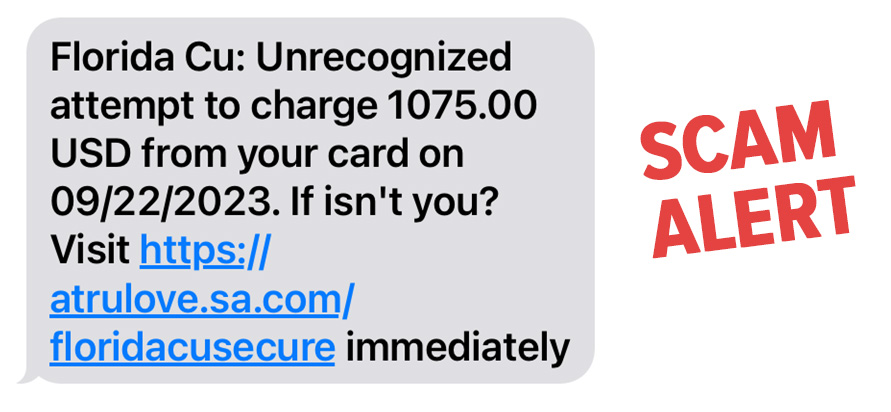
Security Alert 8/11/2023
Fraudulent texts have been reported:
1. Zelle Scam - Fraudsters are sending texts pretending to be Florida Credit Union. They claim a problem with a Zelle transaction – Florida Credit Union does not currently offer Zelle to members.
Sample fraudulent text:
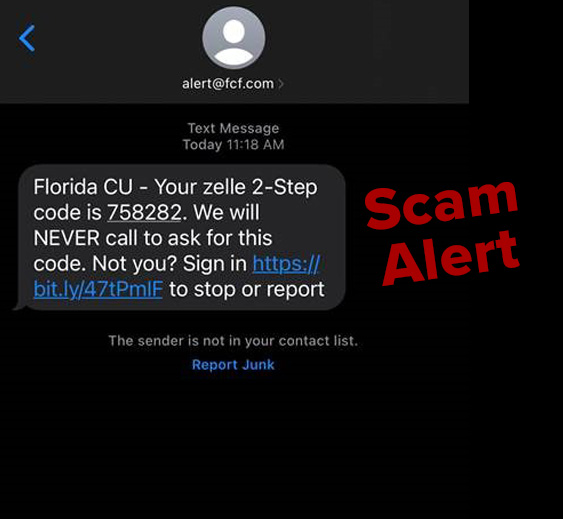
These messages are directing text recipients to a variety of bit.ly addresses which then lead to one particular fraudulent site.
2. Fake Transactions - Fraudsters are sending texts are making members aware of a "questionable" transaction.
Sample fraudulent text: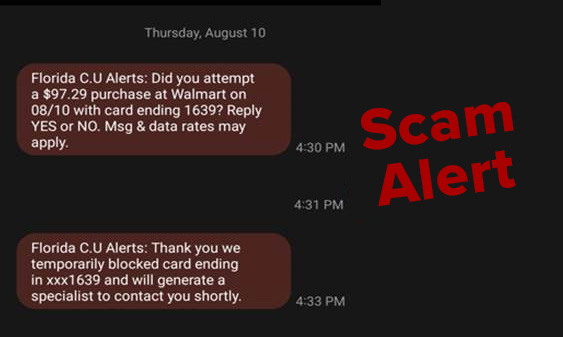
Florida Credit Union learned if someone responds to the text, the fraudster calls the targeted individual's cell phone from the same number listed on the transaction. The fraudster then pretends to be a Florida Credit Union employee helping to block the debit card and set a new PIN over the phone. During the course of this conversation the fraudster asks for the current debit card pin number, allowing the criminal to gather sensitive card information.
If you're ever suspicious about an interaction, hang up immediately and call us at 800-284-1144.
Security Alert 6/29/2023
Fraudulent texts have been reported. Here's how the scam works:
1) You receive a text message claiming to be from FCU asking if you attempted a transaction at a store
2) Answering "no" will prompt another message telling you that an FCU employee will call you
3) A scammer then calls you spoofing our number and guides you through logging into your account in order to get your personal information
If you're ever suspicious about an interaction, hang up immediately and call us at 800-284-1144.
Sample fraudulent text:
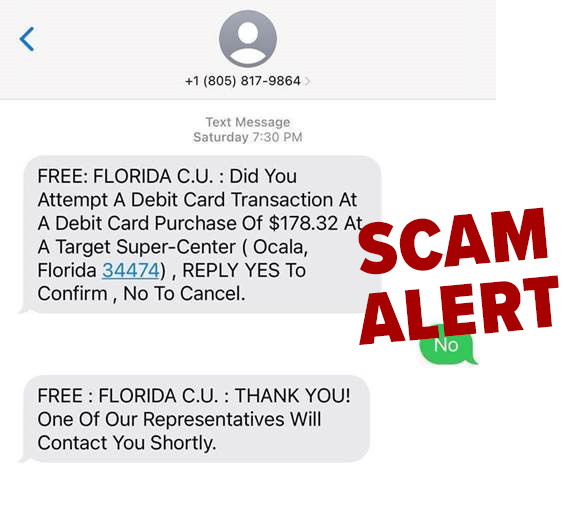
Security Alert 4/7/2023
Fraudulent texts have been reported encouraging members to enter their login credentials, personally identifiable information such as address, date of birth and social security numbers, and card information. Please do not login using these links! We are working to address these scam sites.
Sample fraudulent text:
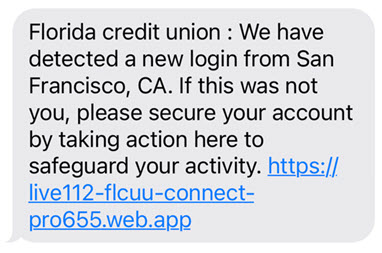
Security Alert 3/31/2023
Fraudulent texts have been reported encouraging members to enter their login credentials, personally identifiable information such as address, date of birth and social security numbers, and card information. Please do not login using these links! We are working to address these scam sites.
Sample fraudulent text:
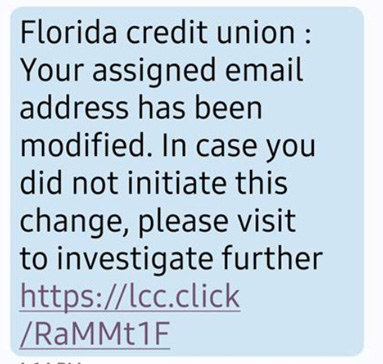
Security Alert 1/12/2023
A fraudulent ad is running in Google encouraging Florida Credit Union members to enter their login credentials. Please do not login using this link! We are working to address this issue. Your financial security is our top priority.
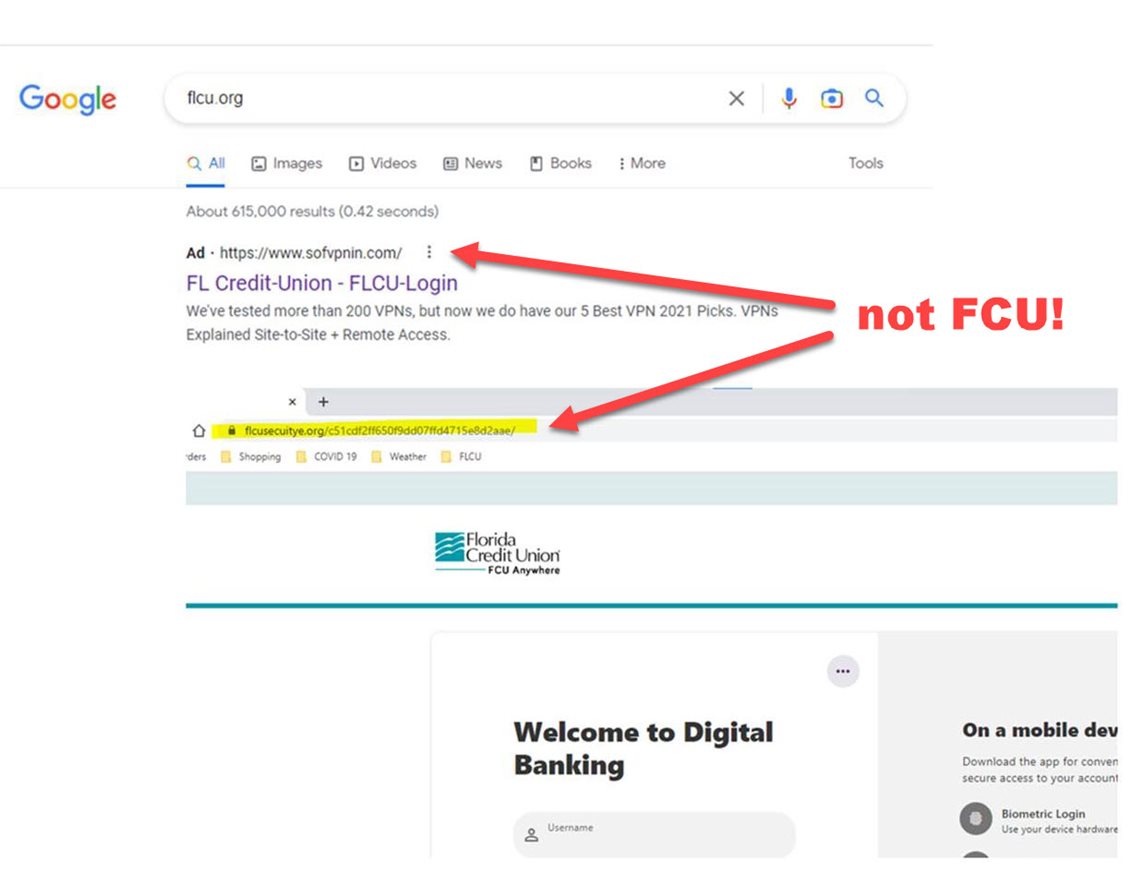
Security Alert 1/30/2020
Each year, the IRS releases a list of the most common tax scams, called the “dirty dozen”. You can visit irs.gov/dirtydozen for the full list, but in the meantime, check out a few scams that make the list year after year:
Phishing: The IRS will never contact you by electronic communication channels, like social media, text messages or email to request personal information. Even if there were problems with your tax filing, the IRS still uses formal letters and a secure website.
Phone Scams: The IRS has seen a surge of phone calls from criminals impersonating IRS agents in recent years. Con artists threaten taxpayers with arrest, deportation and license revocation, among other things. Again, the IRS will not use these methods.
Inflated Refund Claims: Taxpayers should be weary of anyone promising inflated refunds. Preparers who ask clients to sign a blank return, promise a big refund before looking at taxpayer records or charge fees based on a percentage of the refund are probably up to no good.
Identity Theft Refund Fraud: This type of fraud happens when a scammer uses your identity and personal information to file and claim your tax return before you do, stealing your hard-earned money. Avoid keeping important documents like social security cards in easy to access places and be very careful when sharing personal information online.
Think you may be a victim of tax fraud? Contact the IRS immediately and provide all pertinent information.
Visit the eFraud Prevention tab on the Florida Credit Union Facebook page for more information about tax scams, how to prevent them and how to report them.
Have questions about other types of fraud? Browse our full eFraud Prevention library for more information and resources on a broad range of topics to help you stay vigilant and informed.

